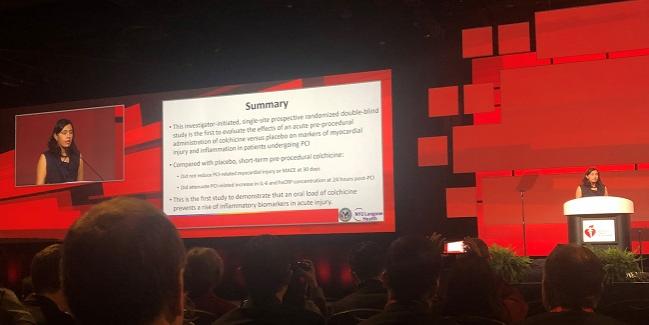No Benefit of Colchicine in All-Comers PCI
COLCHICINE-PCI investigators did see an attenuation of certain inflammatory biomarkers. It’s worth pursuing further, they say.

PHILADELPHIA, PA—Colchicine, given orally prior to PCI in an all-comers population, does not reduce procedure-related myocardial injury, but does appear to attenuate the inflammatory response, results of the COLCHICINE-PCI trial show.
Binita Shah, MD (VA New York Harbor Healthcare System, New York, NY), presented the trial here at the American Heart Association 2019 Scientific Sessions today.
The timing of drug initiation may explain the lack of an impact on the trial’s primary endpoint, Shah told TCTMD. “Our study was the first to show that colchicine could actually prevent a rise of inflammation in the setting of acute injury, but we didn’t see that attenuation of the rise in markers until about 24 hours post-PCI,” she said. “So the [timing] question does come up, and more work is needed to determine the optimal dosing and timing preprocedurally, and perhaps an earlier start to the preprocedure regimen of colchicine warrants further investigation.”
The disappointing trial results come a day after the presentation of COLCOT, which showed that colchicine, an anti-inflammatory agent already indicated for use in gout and pericarditis, lowered the risk of ischemic cardiovascular events after recent STEMI.
COLCHICINE-PCI randomized 714 patients to 1.2 mg of oral colchicine or placebo, 1 to 2 hours before catheterization. More than half of the patients had ACS and the majority had complex coronary disease.
The primary outcome of PCI-related myocardial injury, based on troponin changes according to the universal definition of MI, was no different between groups, occurring in 57.3% of colchicine-treated patients and 64.2% of placebo-treated subjects (P = 0.19). Likewise, no differences were seen for a range of 30-day MACE outcomes.
For the inflammatory biomarker substudy, investigators saw no between-group difference in the primary biomarker endpoint of percent change in plasma IL-6 concentration between baseline and 1 hour post-PCI. However, a number of secondary biomarker endpoints were promising. These included minimal changes from baseline to 22-24 hours post-PCI in the colchicine group both in high-sensitivity C-reactive protein (hsCRP) and plasma IL-6 concentration, changes that were significantly less than those seen in placebo-treated patients.
Of note, there was no difference seen in terms of treatment effects according to whether patients had ACS as the indication for PCI, presence or absence of an intraprocedural complication, or statin therapy status.
“Compared with placebo, short-term preprocedural colchicine did not reduce PCI-related myocardial injury or MACE at 30 days, but did attenuate PCI-related increases in IL-6 and hsCRP concentration at 24-hours post-PCI,” Shah concluded. “This is the first study to demonstrate that an oral load of colchicine prevents a rise of inflammatory biomarkers in acute injury.”
Next Steps
Trial discussant Subodh Verma, MD (University of Toronto/St. Michael’s Hospital, Canada), called the study “important” and urged the investigators to include additional details in any published manuscript, including information on baseline inflammatory markers. Analyses of the CANTOS trial, he noted, suggested that patients who responded the most to canakinumab, another anti-inflammatory agent in this space, appeared to derive the most benefit from the therapy.
For now, Verma concluded, the emerging data on colchicine suggest it may play an important role in patients following an MI, as per COLCOT. It may also prove important in the acute, peri-STEMI period, a question being studied in the 4000-patient, CLEAR SYNERGY (OASIS 9) trial. As for a role for colchicine in the PCI setting, Verma concluded, the answer is “not yet.”
But that setting is still worth investigating, Shah told TCTMD, and in addition to timing, she’s interested in exploring the impact of longer duration of therapy and different doses of the drug. Shah has also received a National Institutes of Health grant to conduct a biomarker substudy within the CLEAR SYNERGY trial. “We are obtaining blood samples from trial participants to try to get a better understanding of, if they improve, who are the patients who were more likely to benefit and who are the patients who may not benefit, and what are the reasons that some people do better with anti-inflammatory therapy versus others. There’s a lot of work still needed to understand this.”
CLEAR SYNERGY principal investigator, Sanjit Jolly (Population Health Research Institute, McMaster University, Hamilton, Canada), commented on the COLCHICINE-PCI results for TCTMD. He pointed out that the mechanism and type of myocardial injury might have played a role, with colchicine having differential effects depending on the underlying event. In COLCOT, he continued, colchicine was given long term, rather than as a loading dose, and longer duration of therapy may have made a difference here, he suggested.
In CLEAR SYNERGY, STEMI patients undergoing PCI will receive either 0.5 mg of colchicine, 25 mg of spironolactone, or an equivalent placebo in a 2 x 2 design, continuing to take the assigned agent or placebo daily out to 1 year.
“There’s been a lot of excitement about colchicine in recent years,” Jolly told TCTMD. “COLCHICINE-PCI adds to the literature, and we’re excited to see the results of our trial in 1 to 2 years.”
Shelley Wood was the Editor-in-Chief of TCTMD and the Editorial Director at the Cardiovascular Research Foundation (CRF) from October 2015…
Read Full BioSources
Shah B. Effects of acute colchicine administration prior to percutaneous coronary intervention: the COLCHICINE-PCI randomized trial. Presented at: AHA 2019. November 17, 2019. Philadelphia, PA.
Disclosures
- Shah reports no relevant conflicts of interest.
- Verma reports speaking and/or research support from Amgen, Abbott, AstraZeneca, BI, Bayer, BMS, Merck, Janssen, Sanofi, Novartis, Lilly, Novo Nordisk, and HLS.


Comments